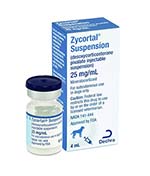Addison’s Disease In Dogs: Symptoms, Treatment & More
When you purchase through links on our site, we may earn a commission. Here’s how it works.

Addison’s disease is a chronic condition that requires lifelong medication to manage. Early symptoms are difficult to diagnose, but without treatment, dogs can experience serious health concerns and even death. We’ll help you understand this fairly uncommon canine disease, how to spot symptoms, and when to contact your veterinarian if you’re concerned that your pup could have Addison’s.
Table of Contents
What Is Addison’s Disease In Dogs?
Addison’s disease, or hypoadrenocorticism, is a condition in which the adrenal glands in dogs fail to produce an adequate amount of the hormones aldosterone and cortisol. These hormones are instrumental in regulating various internal organs and bodily functions and are necessary to keep the body alive. Left untreated, Addison’s disease in dogs can result in serious health problems and even death.
How common is Addison’s disease in dogs? It’s relatively uncommon in dogs and extremely rare in cats. It’s most prevalent in young to middle-aged female dogs but can affect dogs of any age or gender.
What Is Atypical Addison’s Disease In Dogs?
Atypical Addison’s disease is a form of primary Addison’s in which a dog’s adrenal glands still produce sufficient amounts of aldosterone but lack adequate cortisol production. Cortisol is important in regulating white blood cells and glucose levels, monitoring fat production, and decreasing inflammation in the body. So atypical Addison’s requires treatment to maintain a dog’s bodily functions.
What Causes Addison’s Disease In Dogs?
There are two major types of the disease, primary and secondary Addison’s disease, with primary being the most common form. It’s suspected that the primary type of Addison’s results from an autoimmune response in which the dog’s immune system destroys adrenal gland tissue. However, how this happens is still unknown.
A less common cause of primary Addison’s is damage to the adrenal gland from trauma, infection, cancer, or other diseases. Addison’s can also occur when the medication used to treat Cushing’s disease damages the adrenal gland or suppresses adrenal gland activity.
Secondary Addison’s disease can result from a tumor or deficiency in the pituitary gland. The pituitary gland, located in the brain, is an important hormonal regulator for the body. Secondary Addison’s can also develop when a dog is treated with long-term steroids, and the medication is stopped suddenly rather than tapering off the medication.
Dog Breeds Prone To Addison’s Disease

While researchers don’t know exactly what triggers Addison’s disease in dogs, any dog can develop the condition.
Is Addison’s disease hereditary in dogs? While research has shown a genetic link, how the disease is inherited is still unknown. Still, some breeds appear to be more prone to the disease, including:
- Bearded Collies
- Great Danes
- Labrador Retrievers
- Leonbergers
- Nova Scotia Duck Tolling Retrievers
- Portuguese Water Dogs
- Soft Coated Wheaten Terriers
- Standard Poodles
- West Highland White Terriers
Symptoms Of Addison’s Disease In Dogs
Addison’s symptoms can mimic symptoms of many other diseases, so it can be challenging to diagnose. It’s also important to note that symptoms can wax and wane. Here are the most common signs:
- Lethargy
- Depression
- Lack of appetite
- Weight loss
- Vomiting
- Diarrhea
- Excessive thirst
- Increased urination
- Intermittent shaking/trembling
- Slow heart rate
What Is An Addisonian Crisis?
Sometimes the disease causes a sudden presentation of serious symptoms, including extreme weakness, severe vomiting and diarrhea, and even collapse. This event is called an Addisonian crisis, and it’s crucial for you to contact your veterinarian immediately if this occurs.
Diagnosing Addison’s Disease
Your veterinarian will perform a series of blood and urine tests, looking for signs of Addison’s disease. These include anemia, high potassium levels, electrolyte imbalances, and changes in the levels of calcium, chloride, and sodium in the blood.
The definitive diagnostic tool for Addison’s disease is the adrenocorticotropic hormone (ACTH) stimulation test. This test measures cortisol levels before and after a synthetic form of ACTH is injected into your dog, letting veterinarians know if the adrenal glands are functioning correctly.
Addison’s Disease In Dogs Treatment
While canine Addison’s disease isn’t curable, it’s typically managed well with an injection of desoxycorticosterone pivalate (DOCP) that’s FDA-approved to treat Addison’s (brand names are Zycortal or Percorten-V). The injection is given every three to four weeks and can be given at home.
Many dogs with Addison’s also take a daily oral glucocorticoid, a common steroid hormone, in conjunction with DOCP. These medications are required for the rest of your dog’s life. Your vet will also do occasional follow-up blood and urine tests to ensure the medicine is working correctly.
What’s The Life Expectancy Of Dogs With Addison’s?
With proper, ongoing treatment, the long-term prognosis of dogs with Addison’s is excellent. Most dogs will live their normal lifespan, so you likely won’t ever have to worry about putting a dog down with Addison’s disease.
What’s The Best Diet For Dogs With Addison’s?
Dogs with Addison’s disease, as with all dogs, require a complete and balanced diet tailored for a dog’s specific nutritional needs. If you’re already feeding your dog healthy food, you shouldn’t need to change his diet. However, if you’re not happy with your current dog food, you may want to check out our article on the best dog food for various health concerns, ages, and diet types. We also have reviews of the best dog food delivery services, including many all-natural options for fresh food and kibble.
Addison’s Disease vs Cushing’s In Dogs: What’s The Difference?

Cushing’s disease, also known as hyperadrenocorticism, occurs when the body produces too much cortisol. Too much cortisol can weaken a dog’s immune system. However, with Addison’s disease, the body doesn’t produce enough cortisol, which helps the body during stress, regulates appropriate body weight, skin condition, tissue structure, and other essential bodily functions.
When Pet Insurance Can Help
There are many chronic conditions like Addison’s that your dog could develop at any time. These conditions often require expensive, ongoing treatment and medications that can become a real financial burden. Getting pet insurance early in your dog’s life is an excellent way to plan for unforeseeable illnesses and accidents. By paying a low monthly premium, you’re covered against high vet bills. And many pet insurance providers also cover prescription medications. To learn all about how pet insurance works, be sure to read our article, is pet insurance worth it?






